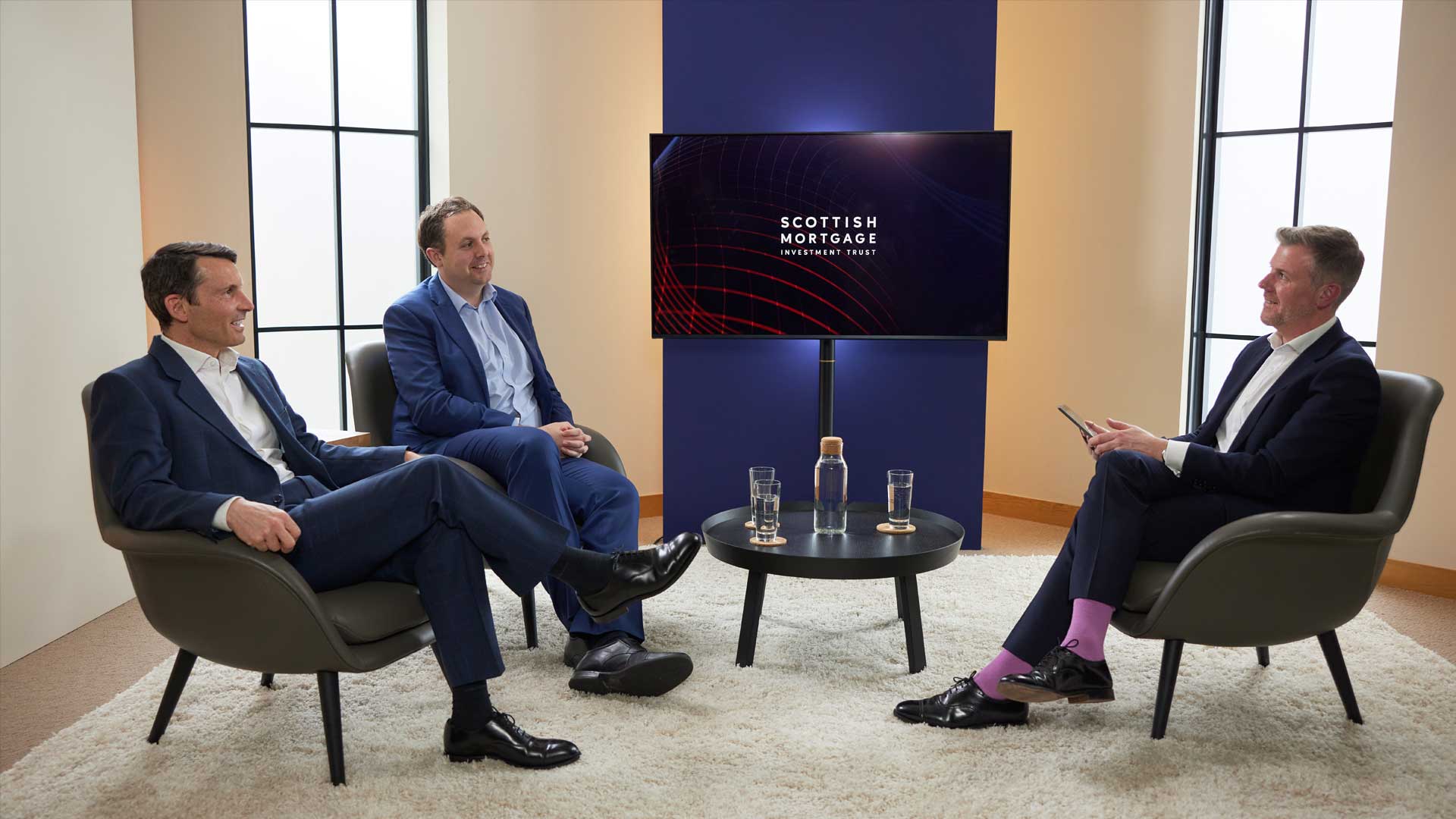Interim managers report
Tom Slater – Manager, Scottish Mortgage
The oddities of the pandemic will fade, some long-running shifts in our economy will have been accelerated and the stresses we have experienced will spark new waves of innovation.

All investment strategies have the potential for profit and loss, your or your clients’ capital may be at risk.
Over the long run, stock market returns are driven by a small number of exceptional companies. The progress of such companies is rarely smooth or linear. They have breakthroughs and they have setbacks. Sentiment in the market exaggerates the peaks and troughs, driving price volatility that is commonly mistaken for risk. When we believe we have identified an exceptional company that is pursuing a large opportunity, we look beyond this cycle of feast and famine. With a longer timeframe, such oscillations matter less and the picture of compounding growth becomes clearer. Many, if not most, investments won’t turn out as we hope. However, for the companies that do succeed, the returns are transformational and they have a disproportionate impact on the portfolio. This is why we approach our task with optimism. It is more important to identify the factors that will allow a company to prosper than to enumerate the potential pitfalls along the way. This approach has driven our long-run returns. Over five years Scottish Mortgage’s net asset value per share with debt at fair value (NAV) has increased by 340% versus a 96% increase in the FTSE All-World index (both in total return terms). Over 10 years it has increased by 674% against 191%. Six months of data is too short a period to infer much that is useful from stock prices. Since the end of March our NAV rose by 76% compared to a 24% increase in the index.
Whilst our focus is on the generation of long-term increases in capital values, we recognise that a small but consistent dividend is of value to many investors. The Board is therefore recommending an interim dividend of 1.45p, a modest increase to the previous year.
Looking at the recent period, we must avoid the temptation to match outcomes with easy or obvious explanations. The global pandemic has, for sure, had big short-term impacts but a company’s stock price incorporates an estimate of all future cashflows and is not simply a measure of relative success at this unusual time. The oddities of the pandemic will fade, some long-running shifts in our economy will have been accelerated and the stresses we have experienced will spark new waves of innovation. More importantly, several holdings have made considerable progress and we have greater clarity on both the size of opportunity and the companies’ ability to execute.
The increase in Tesla’s stock price and its dramatic impact on the Trust’s returns should be seen in context. Whilst the company and its colourful founder attract an unusually high degree of attention, emotion and noise, the underlying return picture is far from an aberration. Returns are concentrated in a handful of big winners. With far less drama, this has been the case for our holdings in both Amazon and Tencent over the past decade. Tesla’s success has been earned over a period of ownership extending back to 2013 and, as with most successful investments, we have endured large drawdowns in its stock price on the way to the current position.
Tesla has made significant operational progress. It has successfully added capacity and the production ramp of its latest model has progressed far more smoothly than for any of its previous vehicles. Demand for its products is strong and the response from its traditional competitors remains muted. It is still our largest holding even though we sold over 40% of our shares during the period (raising £1.18bn) to ensure that the portfolio has an appropriate level of diversification.

This picture of strong execution and greater clarity on the investment case is shared by a number of the portfolio’s other significant winners. Wayfair, the furniture retailer, has benefited from a surge in demand as people have spent more time at home and invested in upgrading their living environment. Whilst this may be a temporary, Covid-related phenomenon, the company has also moved decisively into profitability after an extended investment phase. The long-term profitability of Wayfair’s business model has been hotly debated and the demonstration of a clear ability to make money is much more important for the company’s value than a temporary spike in demand.
Food delivery companies Meituan and Delivery Hero have also answered important questions about their future. The former has grown beyond its nearest rival to become the dominant food delivery company in China. The impact of Covid has been to drive up demand for its other delivery services such as grocery and general merchandise. The addressable market in meal delivery is many times larger than Meituan’s business today and we now must also factor in the possibility of success in these other categories. Delivery Hero has restructured the geography of its business and now dominates many of the world’s most attractive growth markets. Local scale is an important determinant of success and is also allowing Delivery Hero to expand from delivering meals into other delivery services.
The examples of Wayfair, Delivery Hero and Meituan serve to illustrate the growing number of opportunities we have to invest in digital businesses of scale beyond the giant western platforms. This becomes more important as our views on the platform companies are less differentiated than was once the case. In the period, we sold the remaining holding in Facebook and made the first reduction to our Amazon holding that was not driven by diversification concerns. Whilst we have huge respect for Amazon’s vision and ability to execute, its starting capitalisation of over US$1.5 trillion makes the path to large future returns more challenging.

The era of electrification that Tesla is helping to materialise will take decades to arrive and have far-reaching consequences. Technological progress is driving down costs along an exponential curve that the fossil fuel industry will be unable to match. It is challenging to predict the impact of such change on the complex system that is the global economy. We eschew prediction and prefer to partner with the entrepreneurs that are driving change. Encouragingly we are seeing more opportunities. Chinese electric vehicle producer, Nio, has endured difficult trading conditions since its IPO in late 2018 but its business is back on track and its balance sheet has been strengthened by continued investment from its founder and through local government support. In the period we invested in Northvolt, a company which will be critical to the creation of European battery manufacturing capacity. Its access to cheap hydroelectric power in Swedish Lapland should give it a cost advantage as the industry grows rapidly. We also made a commitment to ChargePoint, one of the world’s largest electric vehicle-charging networks.
Outlook
Scottish Mortgage Annual Past Performance To 30 September each year
| 2016 | 2017 | 2018 | 2019 | 2020 | |
| Share Price | 37.0 | 30.3 | 29.0 | -6.4 | 97.8 |
| Benchmark* | 31.3 | 15.5 | 13.4 | 7.8 | 5.7 |
London Stock Exchange Group plc and its group undertakings (collectively, the "LSE Group"). © LSE Group 2020. FTSE Russell is a trading name of certain of the LSE Group companies. "FTSE","Russell" are a trade mark(s) of the relevant LSE Group companies and are used by any other LSE Group company under license. "TMX®" is a trade mark of TSX, Inc. and used by the LSE Group under license. All rights in the FTSE Russell indexes or data vest in the relevant LSE Group company which owns the index or the data. Neither LSE Group nor its licensors accept any liability for any errors or omissions in the indexes or data and no party may rely on any indexes or data contained in this communication. No further distribution of data from the LSE Group is permitted without the relevant LSE Group company's express written consent. The LSE Group does not promote, sponsor or endorse the content of this communication.
Past performance is not a guide to future returns.
Risk Warnings
The trust has a significant investment in private companies. The trust’s risk could be increased as these assets may be more difficult to sell, so changes in their prices may be greater.
About the author - Tom Slater
Manager, Scottish Mortgage
Tom Slater is manager of Scottish Mortgage. He joined Baillie Gifford in 2000 and became a partner of the firm in 2012. Tom joined the Scottish Mortgage team as deputy manager in 2009, before assuming the role of Manager in 2015. Beyond that, he is the head of the US Equities team and a member of another long-term growth equity strategy. During his time at Baillie Gifford, Tom has also worked in the Developed Asia and UK Equity teams. Tom’s investment interest is focused on high-growth companies both in listed equity markets and as an investor in private companies. He graduated BSc in Computer Science with Mathematics from the University of Edinburgh in 2000.
Important information
This communication was produced and approved at the time stated and may not have been updated subsequently. It represents views held at the time of production and may not reflect current thinking.
This content does not constitute, and is not subject to the protections afforded to, independent research. Baillie Gifford and its staff may have dealt in the investments concerned. The views expressed are not statements of fact and should not be considered as advice or a recommendation to buy, sell or hold a particular investment.
Baillie Gifford & Co and Baillie Gifford & Co Limited are authorised and regulated by the Financial Conduct Authority (FCA). The investment trusts managed by Baillie Gifford & Co Limited are listed on the London Stock Exchange and are not authorised or regulated by the FCA.
A Key Information Document is available by visiting our Documents page.
Any images used in this content are for illustrative purposes only.







